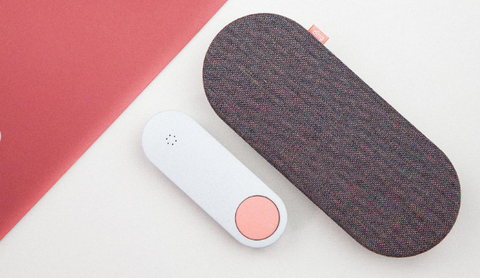FAST COMPANY Never Miss Your Deliveries Again With This Clever Doorbell App
Published by Fast Company, Adele Peters, Thurs 10 November 2016

When a driver rings, the bell automatically calls your phone so you can give instructions.
Missing a package delivery is annoying, but it’s arguably even worse for the climate–every time a FedEx or UPS driver has to make a second or third trip, the carbon footprint of delivery goes up. If the package ends up in a warehouse and you have to drive to pick it up, the supposed efficiencies of online ordering could disappear.
A simple new design brilliantly solves the problem. When a delivery driver rings the Ding smart doorbell, the doorbell rings inside your apartment or house. But it also places a call through an app. If you’re at work, or in the backyard, you can talk to the driver and ask them to leave the package behind.

Right now, as many as 2.4 billion packages miss the first delivery window in the U.S., or 40% of all deliveries. As people keep placing more online orders, delivery drivers are making more pointless trips around cities.
“If you’re ordering more, and you’re busier because everyone’s working longer hours or multiple jobs, you just need to be able to tell drivers, ‘You can try my neighbor because they’re always home,'” says designer John Nussey, co-founder and CEO of Ding, the London-based startup making the new device. “There’s information you can’t always easily get across to these companies, like ‘Leave it behind the dustbins, it will be safe there.'”

Because many deliveries require a signature, the designers are also considering adding some type of audio signature that you could provide over the app. “It could even be a recorded exchange between you and the driver, and that’s your digital proof that you’ve accepted it,” says Nussey.
By making home delivery more feasible, the system might also reduce traffic. In London, for example, the designers say that traffic is getting worse in the city center because people usually work during delivery hours and ask for deliveries at the office; if packages could go directly to homes, there would be fewer delivery trucks blocking traffic on the busiest streets.
For consumers, the obvious appeal is convenience. You’re less likely to miss a package that you might have paid extra to get early, and less likely to end up traveling across town if multiple delivery attempts fail. But the potential emissions savings–and cost savings for delivery companies–are also significant.
If you get a package on the first try, one study found that the trip emits only 181 grams of carbon–24 times less than driving to and from a store about six miles away to buy the same thing, because packing things in a truck is so much more efficient. If it’s delivered on the second try, emissions rise to 271 grams; if the package ends up in a local warehouse and you drive to get it, the carbon footprint goes up to 5,188 grams, more than driving in the first place.
The doorbell, now crowdfunding on Kickstarter, could help eliminate those extra trips. “It saves a few hours of your weekend going to pick up the parcel, a few hours of drivers driving around town,” says John Nussey, Co-founder and CEO of Ding
We have now rebranded to Ome, read all about our rebranding journey here.
